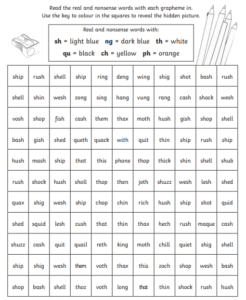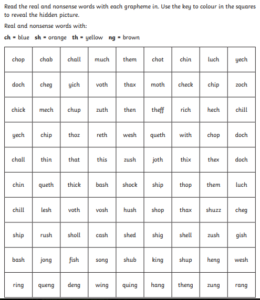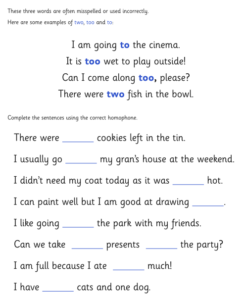10 November 2017
This week’s spelling homework is a spelling task.
Year 1 have a phonics based spelling task. The children need to use their growing phonics knowledge to recognise the sounds in the words. Using the key at the top, colour the box the correct colour. What picture will it reveal? Have a look in the homework books to see which picture your child has.


Year 2 have a homophones task to complete. Homophones are words that sound the same but are spelt differently. This week we are focusing on to, too and two:
- I went to the park.
- I would like to come too.
- I had two bananas.

10 November 2017
Please learn the weekly spellings below for a test on Friday 17 November.
|
i before e, except after c and the exceptions to the rule! |
|
| deceive | protein |
| receive | caffeine |
| perceive | seize |
| ceiling | field |
| receipt | friend |
| deceit | fierce |
10 November 2017
Focus: homophones (same sound, different spelling)
Practise the spelling of these words by writing a line of each, then write one sentence for each word.
Make sure you know which one is which.
- brake / break
- eight / ate
- there / their / there
- grate / great
- weight / wait
- son / sun
03 November 2017
Here are this week’s spellings. Have a look in your child’s book to see which group they are in. Practise spelling these words and writing them in sentences ready to be tested on Friday 10 November.
Group 1
this
that
then
was
you
Group 2
this book
that look
then took
the food
you mood
Group 3
because
every
everyone
where
who
Group 4
because children
every child
everyone mild
where wild
who kind
03 November 2017
Please complete a spelling activity and link it to our spelling list this week.
| Complete a spelling activity from the spelling grid.
i before e, except after c and the exceptions to the rule! |
|
| deceive | protein |
| receive | caffeine |
| perceive | seize |
| ceiling | field |
| receipt | friend |
| deceit | fierce |
03 November 2017
Focus: the ‘ey’ sound
The ‘ey’ can be written down in many ways.
ei eigh ey aigh ay
Find at least 20 words which use these graphemes to represent the ‘ey’ sound. How many different ones can you use in one full sentence?
13 October 2017
This list of words all have a similar ending – but take care… some end -able and some end -ible.
| Learn these spellings for a test on Thursday 19 October. | |
| adorable | horrible |
| considerable | possible |
| comfortable | legible |
| enjoyable | incredible |
| reliable | sensible |
| changeable | terrible |
| laughable | visible |
13 September 2017
This week, we have begun splitting the spellings into four groups. Look inside your child’s book or ask me to see which spellings they need to learn. Practise writing these spellings in a sentence.
Group 1:
|
that
|
|
all
|
|
with
|
|
are
|
|
we
|
Group 2:
|
that
|
jumped
|
|
all
|
hunter
|
|
with
|
jumping
|
|
are
|
cracker
|
|
we
|
buzzing |
Group 3:
|
should
|
|
would
|
|
could
|
|
any
|
|
many
|
Group 4:
|
should
|
ice
|
|
would
|
circle
|
|
could
|
space
|
|
any
|
face
|
|
many
|
city
|
13 October 2017
Focus: Contractions of words
Practise and learn these words for a test next week. Take care – most are contractions (where two words are ‘squashed together’ like ‘i‘ = do not). However, there are a few that sound like contractions, but aren’t (like ‘your‘ and ‘you’re‘).
- don’t
- can’t
- doesn’t
- wouldn’t
- couldn’t
- shouldn’t
- your
- you’re
- there
- their
- they’re
- she’s
Some examples…
- Put your coat on or you’re going to be cold when you go outside.
- They’re going for a walk.
- The children put on their shoes.
- Put the pencils over there.
06 October 2017
This week’s homework is a spelling task. If you find the words easily, write the words in a sentence.
Year 1
Adding the endings –ing, –ed and –er to verbs where no change is needed to the root word

Year 2
The /s/ Sound Spelt using ‘c’ if it comes before the letters e, i and y
